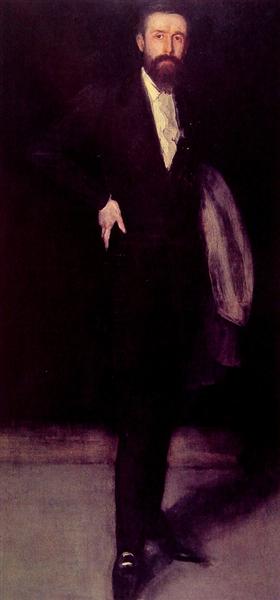Description
"Black arrangement: Portrait of F.R. Leyland - 1873" is a masterful piece created by James McNeill Whistler that encapsulates its tireless search for tonal harmony and compositional elegance. In this work, Whistler presents Frederick Richards Leyland, a wealthy entrepreneur and pattern of the arts, with whom the painter shared an intense but complex friendly and professional relationship.
The painting stands out immediately for its sober color palette, essentially dominated by black, which reflects Whistler's title and intention to focus on tone and aesthetic qualities of the color itself. The use of black not only involves the character, but also confers an air of mystery and dignity to the portrayed. The choice of black as the main color is a bold decision that in turn contrasts with the textures and subtle tonal differences within the same chromatic range, demonstrating Whistler's ability to create depth and visual complexity with a strict chromatic limitation.
F.R. Leyland is represented in a relaxed but imposing possession, with a slightly tilted posture and a hand supported with grace on its hip, while the other holds a cane. This detail not only adds an element of dynamism to the static figure, but also underlines the elegance and status of the subject. His clothing - a sophisticated black suit - and his contained expression suggest an introspection and authority of a man of his caliber.
The composition is studied but apparently simple: Leyland is placed slightly to the left of the center of the canvas, with a background that seems to be a simple wall and a barely suggested socket, which avoids unnecessary distractions and directs all our attention to the subject. By eliminating superfluous details from the environment, Whistler gets every small element in the work to acquire significance, inviting us to contemplate not only man, but the tacit environment that surrounds him.
A fascinating aspect of "Arrangement in Black" is how Whistler uses the principles of "art art" or aestheticism, a movement that defended the idea that the value of art resides in its beauty and not in its narrative content or moral. This portrait is less a personal testimony about Leyland and more an exploration of the shape, line and color. The work thus becomes a study of aesthetics and taste, a visual meditation on the simple and sublime interaction of light and darkness.
Whistler was a pioneer in the use of musical titles for his paintings, As is evident in its series of arrangements and nights, suggesting a connection between music and visual arts. The reference to an "arrangement" in the title of this painting suggests a meticulous and harmonious construction, similar to the disposition of notes in a musical score. Such an election of terminology underlines Whistler's intention that his work was perceived and enjoyed by his formal and aesthetic qualities, instead of his narrative capacity.
"Black arrangement: Portrait of F.R. Leyland - 1873" not only offers us a window to the world of Victorian high society, but also challenges us to reconsider our expectations about what a portrait can and should be. Through its sober composition and focus on the purity of color and form, Whistler manages to create a work that is both a lived portrait and a declaration of aesthetic principles. This portrait, then, is an ode to the expressive abilities of black and, moreover, a tribute to the eternal search for beauty that defines the work of James McNeill Whistler.
KUADROS ©, a famous paint on your wall.
Hand-made oil painting reproductions, with the quality of professional artists and the distinctive seal of KUADROS ©.
Art reproduction service with satisfaction guarantee. If you are not completely satisfied with the replica of your painting, we refund your money 100%.

